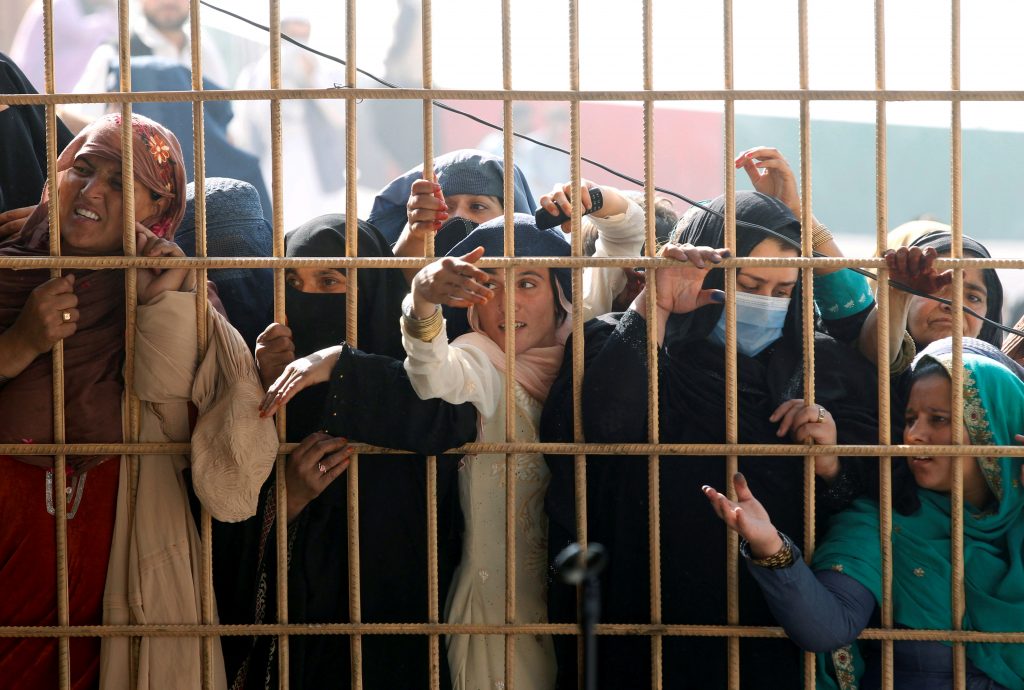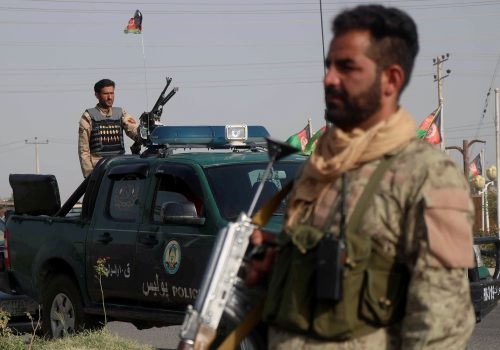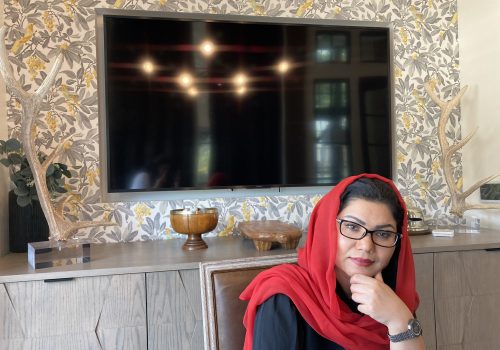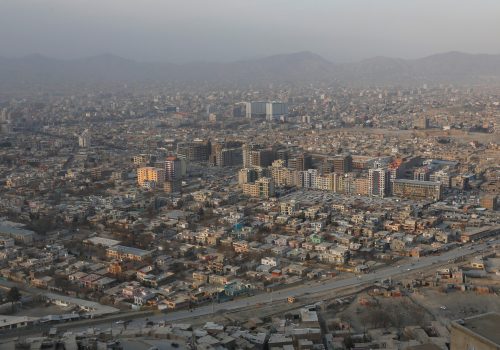Horia Mosadiq is an Afghan human rights activist, political analyst and journalist. She has faced personal threats for her work as an activist and journalist. Horia is currently working with the Afghan Women’s Network in Afghanistan mobilising women across the country to respond to the peace negotiations and was previously with Amnesty International for almost ten years. You can follow her work on Twitter at @Hmosadiq.
The conversation was moderated by Harris Samad, assistant director at the Atlantic Council’s South Asia Center.
TRANSCRIPT OF THE INTERVIEW
HS: Can you give us a quick appraisal of the situation for human rights defenders and other civil society actors on the ground?
HM: The immediate situation for human rights defenders and civil society activists is quite grim because of the ongoing Taliban insurgency across Afghanistan and their control over various towns and townships. They have made advances in several provinces where they have created blockades, so many people are stuck, including many human rights defenders, journalists, and civil society activists.
The number of deliberate and targeted attacks against human rights defenders and civil society activists have also increased significantly since the US-Taliban peace agreement was signed in February 2020. In 2019 and 2018 we had 4 causalities per year. In 2020, 18 activists and human rights defenders were killed along with 3 of their family members. And these are only the cases that we know about and have documented. 2021 has so far been worse than 2020, with the number of deliberate, targeted attacks against women rights defenders, human rights defenders, journalists, and other media–particularly by shooting or magnetic or sticky bombs–increasing significantly.
HS: Are there any other groups being targeted who perhaps the media does not cover as much?
HM: The attacks that happen the big cities, for example in Kabul, in Kandahar, in Nangahar, in Mazar-i-Sharif, always at least make the local news, even if they don’t make international headlines. But there are so many other provinces, places like Uruzgan, Badghis, Faryab, Sar-e Pol, Kunar, Nuristan, where it is very hard to know if and when such attacks are happening because they are not being reported.
HS: What has been the impact of the wave of assassinations? What are the long-term consequences of silencing HRD’s and other activists?
HM: The immediate impact has been a wave of fear because we suddenly saw that we were being targeted and killed, one after the other. This has also led to some level of censorship and to some people having to flee Afghanistan. What has made these attacks particularly horrifying for many of us is that they are being carried out with total impunity. There have not been any investigations by the Afghan government, nor have any of the perpetrators been prosecuted by the government or by the judiciary. And worst of all, the Taliban has kept denying their involvement in these attacks, even though the reality on the ground is very different from what they are trying to project.
HS: Much of the discourse in the international arena over the last two years has focused on peace and the compromises everyone is making, or perhaps needs to make. How do you see this in relation to what is currently happening on the ground?
HM: It has been really disappointing for us that some Westerners, including some former diplomats, have essentially turned into a public relations team for the Taliban. They are trying to sell this idea that the Taliban have changed and that they are “like-minded Taliban” who are not the same as the ones from the 1990s. We are really struggling to understand how they have come to these conclusions, because what we are seeing on tells a very different story.
There are several issues that I think the international community is either ignoring or over simplifying in this effort to rebrand the Taliban. While it is true that the Taliban have changed, they have actually changed for the worse. This new generation of the Taliban is far more ruthless and cruel than their predecessors back in the 1990s. The older generation had at least seen some peace and stability in Afghanistan before the violence started. Unfortunately, this new generation–the majority of them are under the age of 30–have seen nothing but war and atrocities. They have been brought up in Pakistani madrassas, and they were trained and studied the worst and the harshest form of Sharia.
We’re also concerned that many Westerners are over simplifying this war, claiming that it is just the Kabul elites or the Tajiks, Uzbeks, and Hazaras who don’t like the Taliban. “Why don’t the Pashtuns have problems with the Taliban?” they ask. However, the Pashtuns are actually paying a much heavier price to the Taliban than many others. In the past 20 years, many Pashtuns— including tribal leaders—have been killed by the Taliban. Pashtun children have been deprived of education, and Pashtun families have been deprived of access to fundamental services such as health care, drinking water, and other humanitarian services. A few weeks ago, we saw the massacre that happened in Spin Boldak. In this incident, the Taliban didn’t show any mercy for a poor comedian who had nothing to do with the international invasion, who had nothing to do with the Afghan government, who didn’t speak out on human rights or democracy or do anything of that sort. He was just a simple comedian. And yet, they brutally tortured and killed him. These types of actions clearly show that it is not just Tajiks, Uzbeks, or Hazaras that have a problem. Pashtuns are also suffering and, in many ways, they are being punished simply because they live in areas that are controlled by the Taliban.
Finally, the international community is also ignoring the role that countries like Pakistan are playing with their proxy war in Afghanistan and with their continued sponsoring of radical and violent extremist groups, which they then export to Afghanistan and across the region
HS: There’s a common comparison between the deteriorating security conditions on the ground today with the way the conflict evolved in the 1990’s. How accurate is this, particularly in relation to HRDs and activists?
HM: I would not say the situations are similar. I was also a journalist and a human rights activist working in Afghanistan in the 1990s. The biggest difference was that back then human rights defenders were not targeted specifically because they were human rights defenders. We did have some cases of attacks against journalists, including Mirwais Jalil, who was killed by Hizb-e-Islami Hekmatyar, but in no way were those attacks comparable to what is happening now. Back then it was a generalized insecurity and generalized human rights violations happening at a very large scale. What is happening today is that people are being categorized and they are being specifically targeted based on those categories. Human rights defenders, civil society activists, and journalists are the first groups being targeted because we are the ones who are speaking out, we are the ones who are connected with the outside world, we are the ones who are raising awareness about the atrocities that are happening inside Afghanistan.
Another difference is that in the 1990s people were fed up with the civil war and the lack of law and order when the Taliban rose up. We wanted someone to come and the Taliban at that time had popular support because they promised that they would disarm the factions, end the fighting, and pave the way for an interim government, a jirga, and for Afghans to elect their own government. They came with a white flag, telling people that we are the messengers of peace. There was almost no resistance. But now the situation has changed. During the 1990s people saw first had that Taliban rule did not peace or disarmament. They were a vicious group with the single objective of destroying and killing whoever stood against them and by the end of the 1990s we all knew that the Taliban are also a gender apartheid regime. There was no space for women in their government or in the society. They simply wiped us out. We didn’t exist for them. We also saw the level of violence that they inflicted on other ethnic and religious groups. The way that they have massacred Hazaras and the way that they discriminated against Hindus and punished them for their religious beliefs, forcing them to put yellow flags on their homes. All of this made people realize that contrary to what the Taliban were claiming, they are not trustworthy.
Today, have a government in Afghanistan. People are enjoying their rights under Afghanistan’s new constitution. People are not being whipped on the streets because they are wearing certain types of clothes, or because they are not going to the mosque five times a day or not growing a beard. People aren’t being whipped on the streets for listening to music, or being amputated in broad daylight in a stadium for stealing a piece of bread. People are not being stoned to death. We have some degree of rights and freedoms, we have free media, and we are enjoying many services that are provided by the government.
HS: What can the international community do to put in place more robust protection measures and mechanisms for the country’s HRDS, journalists, and civil society actors?
HM: There are several things that the international community can do. One of the immediate steps that need to happen is for the international community to put more pressure on the Taliban and on Pakistan. They should hold the Taliban to account for the assassinations and targeted killings of human rights defenders, journalists, and civil society activists. And if the Taliban continue to claim that they are not behind these attacks, they should be forced to publicly state that these acts are unacceptable under any circumstances. Because they have never done that publicly and instead have legitimized those attacks.
The international community also needs to put pressure on the Afghan government to increase accountability for the crimes that are committed against journalists, civil society activists, and human rights defenders. At the end the day, the Afghan government, as our legitimate government, has an obligation and a responsibility to protect the people. The Afghan government did launch a strategy back in 2020 and formed a joint commission for the protection of human rights defenders. The international community needs to ask about what this commission has achieved and what policies and strategies have been implemented. They put pressure on so that we get state protection and that when crimes are committed, they are investigated and the perpetrators are brought to justice.
I also think that the international community has so far failed to allocate enough resources for the protection of human rights defenders and journalists. As soon as the peace talks with the Taliban were sorted, much of the focus went into the efforts around peacebuilding. They automatically forgot about human rights, democratic values and the protection of human rights defenders. This needs to be brought back to the top of the agenda, with the international community providing not only financial but also political support. Things like granting of emergency visas for those who are at risk. As someone who is working on a daily basis with journalists and human rights defenders on the ground, I can assure you that most people don’t want to leave Afghanistan and seek asylum. But it is really important that there at least be some guarantees in place that if and when the situation gets worse, when someone is at immediate and imminent risk, they should have the option to leave Afghanistan and go somewhere safe until the threat is mitigated.

The South Asia Center is the hub for the Atlantic Council’s analysis of the political, social, geographical, and cultural diversity of the region. At the intersection of South Asia and its geopolitics, SAC cultivates dialogue to shape policy and forge ties between the region and the global community.
Image: Afghan women wait to receive tokens needed to apply for a Pakistani visa, after others were killed in a stampede for the tokens in Jalalabad, Afghanistan October 21, 2020. REUTERS/Parwiz TPX IMAGES OF THE DAY



